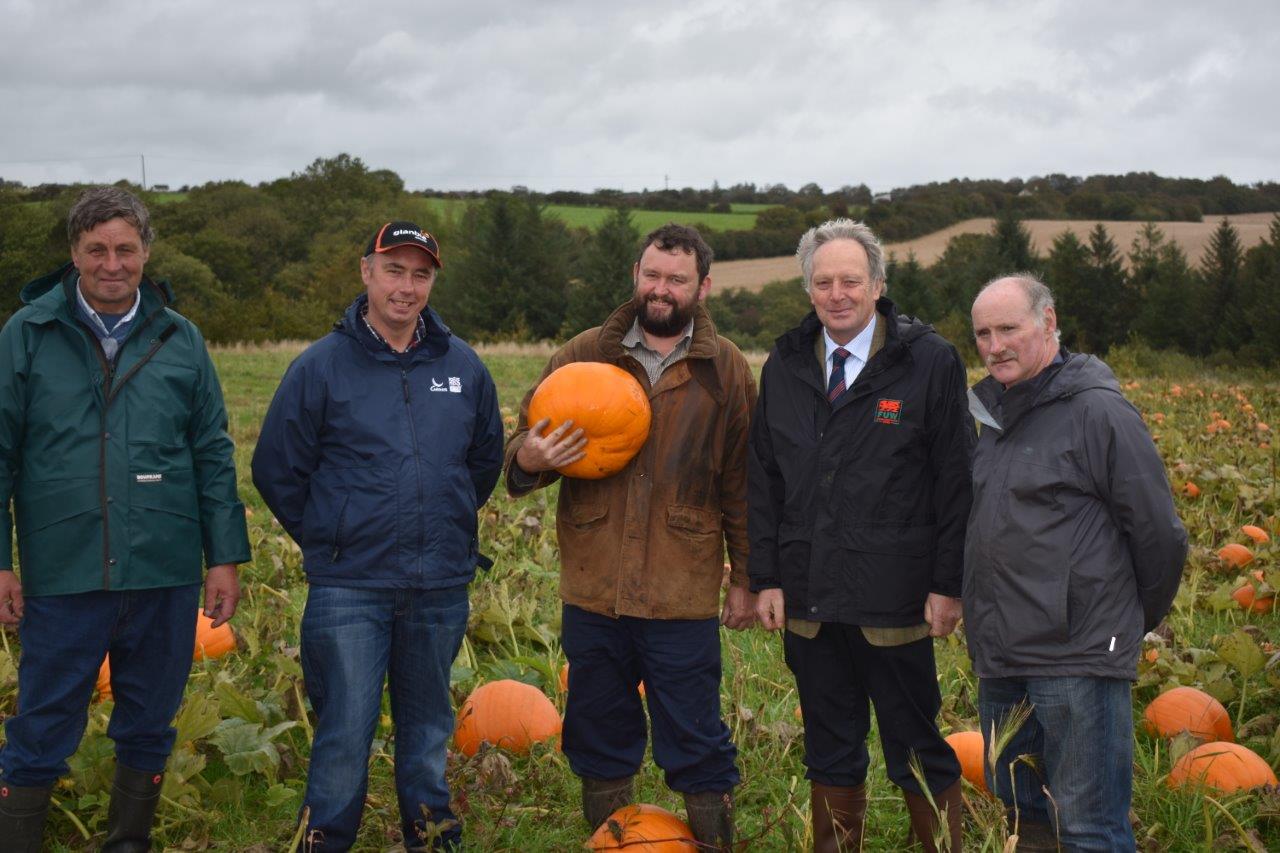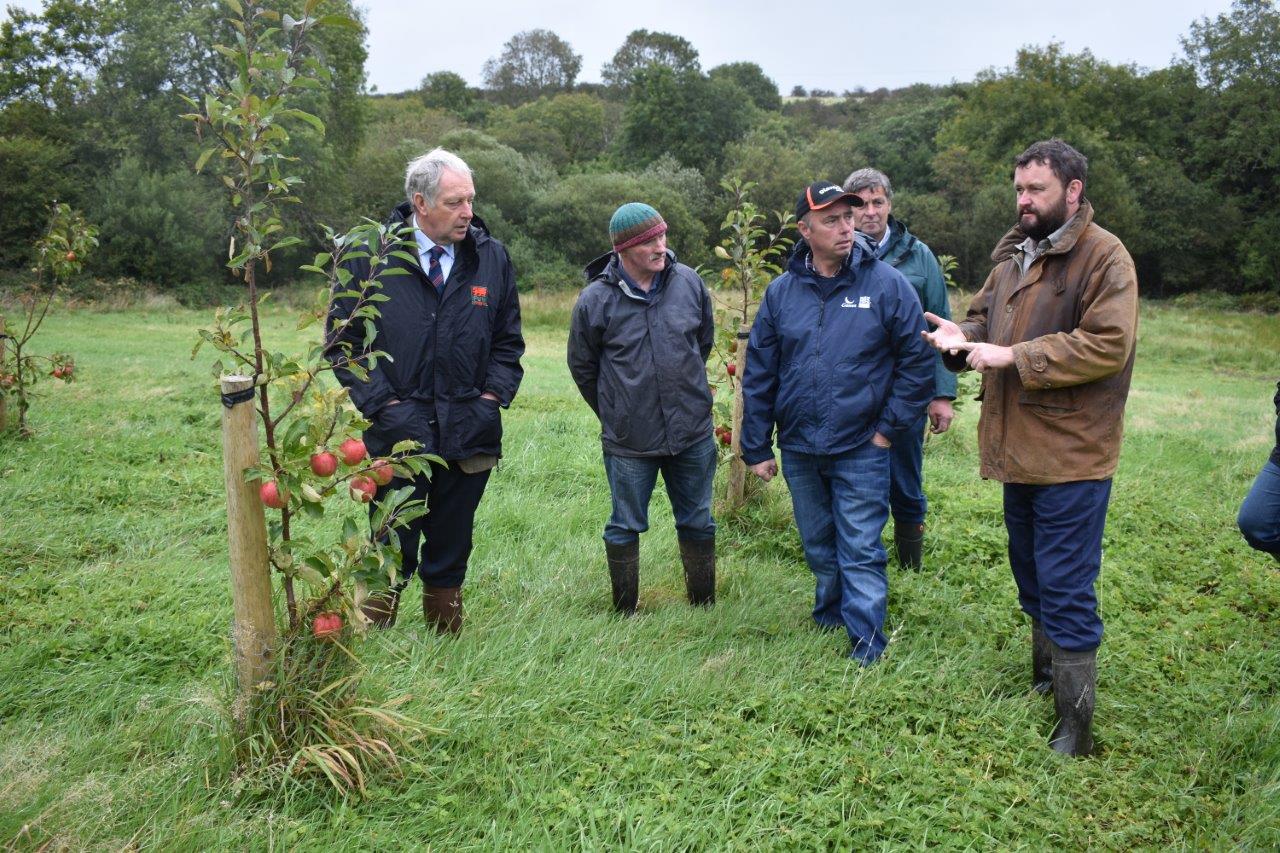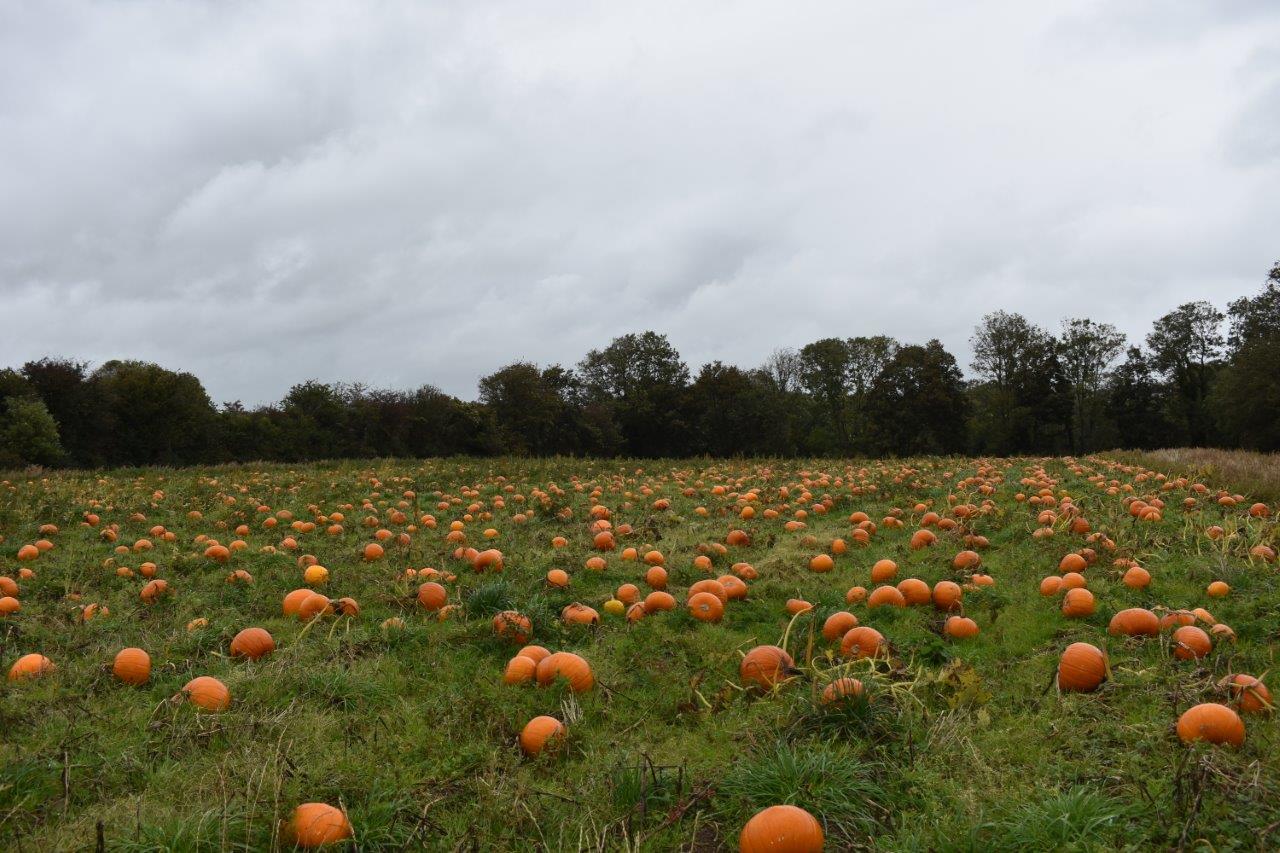
FUW Pembrokeshire Vice Chairman Alun Phillips,
Gary Rees,
FUW Deputy President Brian Thomas and
FUW Pembrokeshire President Hywel Vaughan.
Tucked away just outside of Haverfordwest in the beautiful Pembrokeshire countryside and just 5 miles from the coast is Brooksgrove farm. Normally when we think of a farm the usual livestock or dairy business comes to mind, but here you will find neither cow nor sheep.
Brooksgrove Farm is a small family run enterprise and has been in the Rees family since the 1950s. It was originally farmed as a small mixed farm supplying local customers with milk, meat, poultry, eggs and vegetables.
But, like many small farms using this pre-war model of farming, it became increasing difficult to make a living and the farm slowly fell into disrepair.
In 2011 the farm switched to horticultural production and now the third generation of the Rees family is growing a range of seasonal produce including, daffodils, strawberries, raspberries, gooseberries and pumpkins. They have also created a new native woodland by planting over 4,000 trees, as part of a Glastir Woodland scheme.
Speaking about the switch to horticultural production, Farmers’ Union of Wales member Gary Rees said: “ I chose horticulture as I have an interest in growing things and get much satisfaction from seeing something grow from a seed. Also, I felt that the modest acreage at Brooksgrove Farm would be more likely to earn a living by growing smaller areas of higher value crops.”
Today the family grow around 7 acres of daffodils, which is approximately 42 tonnes of bulbs. There are 20 varieties, the bulk of which are traditional yellow daffodils, with smaller quantities of ornamental narcissus. This gives them a flower season from January until late April, with most of them being supplied to Puffin Produce . Their beautiful Welsh Daffodils are now also available to order online as a gift sent straight from the farm.

and FUW Pembrokeshire Vice Chairman
Alun Phillips the last of the cut-flower crop.
To cover the summer season, Gary grows two acres of soft fruit, which includes five varieties of strawberries, three varieties of raspberries and one variety of gooseberries. The season at Brooksgrove Farm lasts from about the beginning of June until the beginning of August, with most of their sales coming from the ‘Pick your own’ scheme and a small quantity going as wholesale.
Never afraid to try something new, Gary ventured into cut flowers for the first time this year, setting aside an acre to start with. “I thought I’d give it a go and some of it went very well, other aspects not so much. What did surprise me though was the interest from local florists and I look forward to continue working with them to develop the range of flowers we grow here,” said Gary.
Diversifying further Gary planted two acres of apples (400 trees) between 2016 and 2017 for eating and cider production. There are ten varieties of trees on two different rootstocks, which will give a small crop of apples in the first few years with output expected to increase after 4 to 5 years.
As summer turns to autumn, the green fields at Brooksgrove slowly change into a delightful blanket of patchwork orange. Three acres of the farm are dedicated to eight different varieties of pumpkins, which were chosen for their size and colour.
Most of the produce is sold through the Pumpkin Patch which opens middle of October and even though it looked like it was going to be a bumpy ride for the crop this year, Gary is pleased with the outcome.

between 2016 and 2017 for eating
and cider production.
“We lost a lot of pumpkin plants with the wet and windy start to June this year. Fortunately, the bulk of the plants were planted a week earlier in a different field and have produced a good crop. We’re now getting ready to harvest them and look forward to welcoming everyone back to the farm to chose their favourite pumpkin to take home,” he said.
And like on any other farm, there is no such thing as an average day and the jobs are endless. “I just put my nose out of the door and there is a job to be done - ploughing, harrowing , planting, potting, mowing, building, digging, mulching, pruning, picking, packing, selling, delivering, website, social media, paperwork etc. - the list never ends.
“This time of year I would like to be finishing planting daffodil bulbs, pruning raspberries and getting the Pumpkin Patch ready. In future years this will also be apple harvest time as well as selling the last of the cut flowers before the frosts come,” he says.
Well on the way to success now, things have not always been easy and stumbling blocks have been many. “The two major problems have been the weather and trying to maintain a cash flow, whilst growing the business. Summer 2012 was very wet and saw a loss of 80-90% of the strawberry crop and an almost complete loss of the first trial of pumpkins.
“Add to this a poorer than expected first year daffodil yield and the well-publicised lending constraints on small firms by the banks it was a very difficult time. And this was just our second year of trading. And yes, I had given up the day job,” recalls Gary.
Looking forward to the next five years the family business is aiming to increase the amount of processing of their primary produce to help reduce wastage and add value. They’re also looking to increase online sales and develop the cut flowers. 
“We are just putting the finishing touches to our 6,000 sq ft nursery and will be using it for the propagation of our own plants. As a small business it is always difficult to compete with the prices of the larger growers and importers in a wholesale environment.
“But by being a grower-retailer and engaging directly with the customer, it is possible to have a viable farming enterprise on a smaller scale and still be competitive with pricing.
“If we could just have a greater commitment from local and national government to support local procurement then this would be a huge boost to rural enterprises of any scale,” said Gary.
FUW Deputy President Brian Thomas, who recently visited Brooksgrove Farm, said: “It was a great experience walking around the farm with Gary and seeing all of the different aspects of the farm.
“He certainly is innovative and I think we can learn a lot from his attitude to trying new things. What this enterprise here highlights, is the need for continued support for our small family farms and the need for improved procurement policies.
“It can not be underestimated how much family run businesses, like Brooksgrove Farm, contribute to the local economy and we simply can’t allow them to be a casualty of poor Brexit planning and failed negotiations.”


